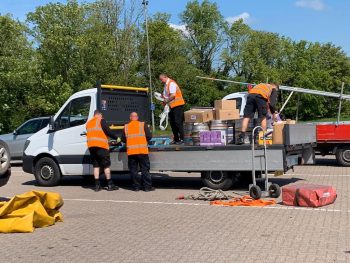The construction and highways sectors are collectively saving hundreds of thousands off their bottom line and enhancing their road risk management with the help of the free, government-backed Driving for Better Business (DfBB) programme.

Run by National Highways, the scheme works to improve the levels of compliance for those who drive or ride for work by demonstrating the significant benefits of managing work-related road risk more effectively.
Its systematic approach to fleet and risk management is being used by thousands of businesses, and organisations in construction and road maintenance have reported 12 common measurable business benefits, ranging from lower at-fault incident claims to reduced speeding penalties, lower cost of maintenance and lower fuel consumption.
Now, the DfBB is sharing some of these stories – including the challenges they faced, how they met those challenges, and the benefits they’ve seen as a result of engaging with the free Driving for Better Business programme – on its website.
Highlights include:
Balfour Beatty, which manages the road risk of around 12,000 drivers. Over the last six years, the construction company reported its crash frequency rate fall by 63% – equivalent to £570,000 of annual benefits.
Amey, responsible for 11,000 drivers, reported at-fault incidents down 38% over 12 months from 1380 in 2016 to 89 in 2018.
Tarmac, part of the CRH group, saw a decrease in speeding of 10% across all geographical areas (25% in the North and Scotland) and its insurance claims drop by 48%. A continued focus on risk management has seen insurance claims fall consistently year on year, from 589 in 2016/17 to 255 in 2019/20 – a reduction in claims of nearly 50%.
Carnell, specialists in road maintenance, has some 280 operatives, 200 vehicles covering 4 million miles a year. It reports a reduction in annual insurance claims costs from £130,000 to £46,000 and the number of driver interventions – such as post-crash interviews and further training – down a staggering 85% over a 3-year period, significantly reducing the demands on admin and management time.
WJ, the UK’s leading road marking reported all insurance claims down 15%; own fault claims down 20%; fuel use down 3.6%.
Infrastructure specialists the Costain Group plc recognises the importance of managing Occupational Road Risk relating to its employees and the safety of all other road users, as seriously as any other business-related activity. Through its engagement with the Driving for Better Business scheme, it reports collisions down 17%; collision costs down 18%; fleet insurance premiums down 9%.
Clancy Docwra is one of the largest privately-owned construction firms in the UK reported a saving of £65,000 on fuel, congestion charge fines down 76% and traffic offences down 59%.
Others with case studies on the website include Colas, Skanska, Ringway, Toppesfield and Wilson & Scott.
According to the HSE, on average, each year, about seven workers die from accidents involving vehicles or mobile plant on construction sites. A further 93 are seriously injured.
“The construction and highways industries are acutely aware of the risks on-site and, for years now, have focused on eliminating hazards in the workplace,” said Simon Turner, campaign manager for Driving for Better Business. “Many are recognising that any vehicle becomes part of the workplace.
“There is clearly a strong business case for managing work-related road safety. Fewer road incidents mean fewer days lost to injury; fewer repairs to vehicles with vehicles out of action; fewer missed orders and overall reduced running costs. Now is the time to become better informed and start getting the benefits of better practice.”
Earlier this year, Driving for Better Business highlighted the important role of trade associations in raising awareness and setting standards of safety – particularly in the construction sector. Tippers and open-topped trucks are the vehicles most likely to have insecure loads.
For more on the business case for reducing road risk in organisations, click here.
The DfBB has also published a podcast on ‘Safe loading – where do fleet operators get it wrong?’.
Further practical, free-to-access resources for the construction sector on safe loading and operation are also available on the DfBB site.

